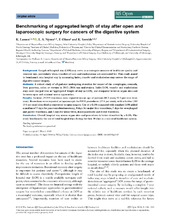Benchmarking of aggregated length of stay after open and laparoscopic surgery for cancers of the digestive system
Peer reviewed, Journal article
Published version

Åpne
Permanent lenke
https://hdl.handle.net/1956/19739Utgivelsesdato
2018-08-01Metadata
Vis full innførselSamlinger
Originalversjon
https://doi.org/10.1002/bjs5.67Sammendrag
Background: Length of hospital stay (LOS) may serve as a surrogate measure of healthcare quality and resource use, particularly when transfers of care and readmissions are accounted for. This study aimed to benchmark true hospital stay by measuring index, transfer and readmission stays across the range of digestive cancer surgery. Methods: A cohort study of all patients undergoing resection for cancer of the oesophagus, stomach, liver, pancreas, colon or rectum in 2012–2016 was undertaken. Index LOS, transfer and readmission stays were merged into an ‘aggregated’ length of stay (a‐LOS), and compared between organ sites and between open and minimal‐access approaches. Results: In total, 24 354 resections were reported (mean age of patients 68·3 years; 51·3 per cent were men). Resections were reported as laparoscopic for 9151 procedures (37·6 per cent), with a further 283 (3·0 per cent) described as converted to open surgery. Use of a‐LOS compared with standard LOS added a median of 5 days for pancreatoduodenectomy, 4 days for major liver resections, 3 days for oesophageal and gastric resections, and 2 days for minor liver, distal pancreatic and rectal resections. Conclusion: Overall hospital stay across organ sites and procedures is better described by a‐LOS. The study benchmarks the use of total hospital days during the first 30 days in a universal healthcare system.
